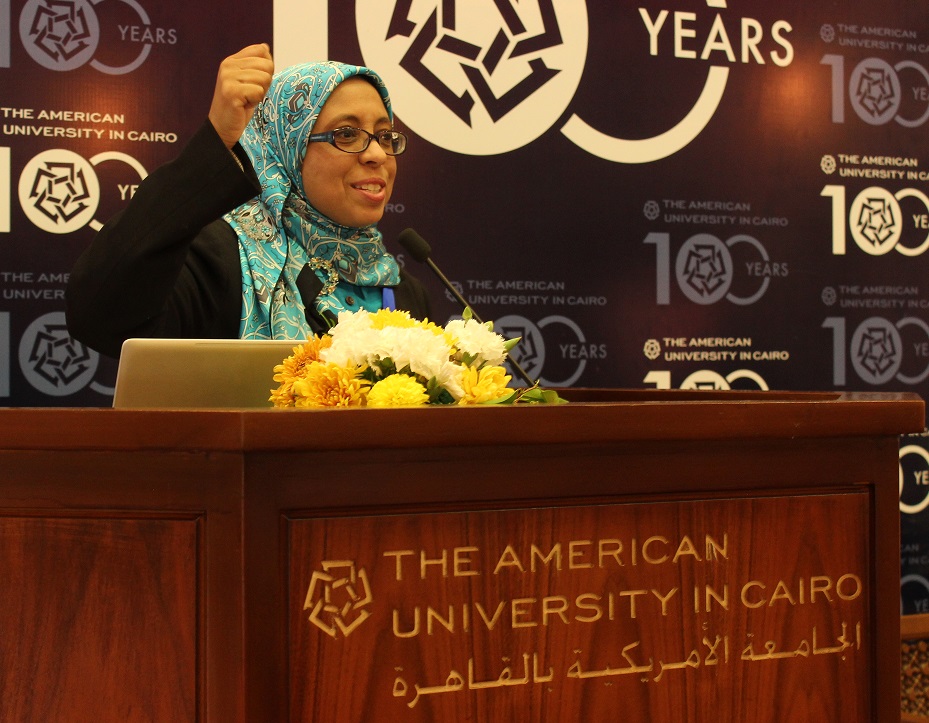
Mona Amer
- Position: Professor
- Department: Department of Psychology
- Email: monaamer@aucegypt.edu
Mona Amer is a professor of psychology with specializations in clinical and community psychology. She is the founder of the Department of Psychology at The American University in Cairo (AUC) and was its first elected chair. She received the university’s annual Excellence in Teaching Award upon nomination of students, as well as other teaching distinctions such as the annual Best Faculty-NGO Partnership Award and an Innovative Teaching Award by AUC's Center for Learning and Teaching (CLT). Amer has been active in more than 175 academic and professional committees, about half in leadership capacity, earning her the university’s annual Excellence in Service Award. This includes co-founding and serving as first elected president of the American Arab, Middle Eastern, and North African Psychological Association, which has become the fifth recognized ethnic minority professional psychological association in the US.
Amer has received many accolades for her pioneering work related Arab and Muslim American minorities. She has around 50 publications, including two papers in American Psychologist, the flagship journal of the American Psychological Association (APA), and two landmark books focused on counseling Muslims and Arab American psychology. In 2016 her co-edited book Handbook of Arab American Psychology received the Evelyn Shakir Non-Fiction Award at the Annual Arab American Book Awards by the Arab American National Museum (a Smithsonian affiliate). The book is listed in a timeline of important moments in psychology’s history in Kassin et al.’s introductory psychology textbook Essentials of Psychology. Her co-edited book Counseling Muslims has sold more than 2,000 copies and is translated in Italian and Turkish. In 2019 she received a national Scopus Award in Psychology that was co-administered by Egypt’s Minister of Higher Education and Minister of Education, representing the country’s highest-impact scholarship in psychology. In 2020 she was honored with the Award for Distinguished Contribution to Psychological Scholarship by the American Arab, Middle Eastern, and North African Psychological Association. In 2023 she was selected by the American Psychological Association to be featured in the documentary film Representation Matters, highlighting 30 diverse influential psychologists. Amer has been a keynote speaker at professional conferences in many countries, including US, Canada, UK, Malta, and Italy.
Amer received her PhD in clinical psychology from the University of Toledo, Ohio, in 2005. She completed her pre-doctoral internship at the Connecticut Mental Health Center and The Consultation Center at the Department of Psychiatry, Yale University School of Medicine. In 2006, she was awarded the annual American Psychological Association’s Award for Distinguished Graduate Student in Professional Psychology "for her outstanding and innovative leadership in addressing the mental health needs of Muslim and Arab Americans". She then pursued a two-year postdoctoral specialization in ethnic/racial behavioral health disparities at the Program for Recovery and Community Health, also housed at the Yale Department of Psychiatry. This was as the sole recipient of the 2005-7 APA Minority Fellowship Program’s Postdoctoral Fellowship in Mental Health and Substance Abuse Services. In parallel, she taught as an adjunct professor for the community psychology Master’s program at the University of New Haven. This was followed by an assistant clinical professor position at the Yale Department of Psychiatry that overlapped with her arrival at AUC in 2007. Amer is a licensed psychologist in the state of Connecticut.
Amer’s primary research and policy interests revolve around racial/ethnic and religious disparities in behavioral health. Disparities include poorer mental health status, reduced service access, poorer quality of care, and poorer service outcomes for minority groups. She is interested in how immigration experiences, acculturation stressors, discrimination/ stigma, and minority status contribute to these disparities and the roles of culturally competent services and community-based programming in eliminating the inequalities. Within this framework, she has specializations in the Muslim American and Arab American populations, particularly in the hostile post-9/11 socio-political context. To enhance scholarship and community practice focused on these populations, she has worked on psychometrically sound instruments for use in minority research and analysis of applications of ethical codes of practice.
Amer is internationally recognized as a trailblazer in developing specializations related to Muslim and Arab minorities. In 2000 she launched the online Muslim Mental Health Network that was the catalyst and organizing platform for formalizing the interdisciplinary field known as Muslim mental health. Around that time, she designed some of the first cultural competence workshops and accredited training conferences for practitioners serving Muslim clients that were administered in the US and UK. She was on the founding board and served as editor-in-chief of the Journal of Muslim Mental Health. She also served as a Steward Group Member of the National Network to Eliminate Disparities at the US Substance Abuse and Mental Health Services Administration (SAMHSA) and participated in other SAMHSA and US Department of Health and Human Services initiatives related to Arab, Muslim, and ethnic/racial minority communities. Amer also spent more than a decade collaborating with colleagues to envision and work towards a professional association representing Arab/MENA psychologists. The resulting organization AMENA-Psy was incorporated as a 501(c)3 in December 2016. Amer was the steering committee co-chair, on the founding Board of Directors, and elected as first president.
Amer's research interests include:
- Acculturation and mental health of adult Arab Americans
- Identity development and behavioral health of Arab Muslim American youth
- Double burden of mental illness stigma and racial/ethnic stigma on mental health symptoms for Latino American and African American minorities
- Culturally competent psychotherapy and counseling for Muslims
- Using Rasch modeling to develop psychometrically sound measures for Arab Americans
- Ethical values and standards for working with Muslim and Arab minority communities
- Impact of youth civic service, including required university community-based learning and voluntary community service